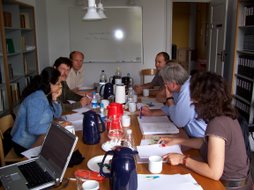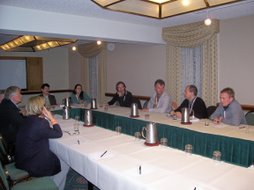TRANSFORMING URBAN WATERFRONTS: FIXITY AND FLOW
In port cities around the world, waterfront development projects have been hailed both as spaces of promise and as crucial territorial wedges in twenty-first century competitive growth strategies. Frequently, these mega-projects have been intended to transform derelict docklands into communities of hope with sustainable urban economies—economies intended to both compete in and support globally-networked hierarchies of cities.
This collection engages with major theoretical debates and empirical findings on the ways waterfronts transform and have been transformed in port-cities in North and South America, Europe, the Caribbean. It is organized around the themes of fixities (built environments, institutional and regulatory structures, and cultural practices) and flows (information, labour, capital, energy, and knowledge), which are key categories for understanding processes of change. By focusing on these fixities and flows, the contributors to this volume develop new insights for understanding both historical and current cases of change on urban waterfronts, those special areas of cities where land and water meet. As such, it will be a valuable resource for teaching faculty, students, and any audience interested in a broad scope of issues within the field of urban studies.
Transforming Urban Waterfronts Fixity and Flow
Editors: Gene Desfor; Jennefer Laidley; Quentin Stevens; Dirk Schubert
Publisher: Routledge, USA
Sunday, November 28, 2010
Friday, November 28, 2008
Hamburg Conference 2008
Urban waterfronts have historically played a crucial role in the processes of urbanization in port cities around the world – whether viewed from the perspective of the growth of the built environment, the economy, or socio-cultural systems and institutions. While this remains the case, recent large scale socio-economic changes make the conference particularly opportune at this time. Large investments have been
made, and more are being planned, in urban waterfront development projects around the world that are envisioned to have major infl uences on the form of cities, their role in both local and international systems, and the social relations that occur within them. Waterfront developments are being promoted as spaces of promise and crucial territorial wedges in 21st century competitive-city growth strategies.
The ‘fixity and flow of urban waterfronts’ is an exciting and innovative concept that captures the many tensions that give rise to change on urban waterfronts. It also provides a critical lens through which to analyze the dynamism and interconnectedness of the tangle of relations and organizations associated with waterfront development. While waterfronts have always been special places where land and water meet, they have recently become leading sites for achieving urban transformations as cities compete at a global scale to attract corporations in the new information processing economy and their high-income jobs. A spatial expansion and integration of the global economy is fundamental to these recent urban waterfront developments.
Hamburg provides a particularly appropriate location for the conference: it is a city with a long and rich waterfront history, and recent changes to these lands and plans for additional expansion of port facilities all make for an exciting case to see and study.
made, and more are being planned, in urban waterfront development projects around the world that are envisioned to have major infl uences on the form of cities, their role in both local and international systems, and the social relations that occur within them. Waterfront developments are being promoted as spaces of promise and crucial territorial wedges in 21st century competitive-city growth strategies.
The ‘fixity and flow of urban waterfronts’ is an exciting and innovative concept that captures the many tensions that give rise to change on urban waterfronts. It also provides a critical lens through which to analyze the dynamism and interconnectedness of the tangle of relations and organizations associated with waterfront development. While waterfronts have always been special places where land and water meet, they have recently become leading sites for achieving urban transformations as cities compete at a global scale to attract corporations in the new information processing economy and their high-income jobs. A spatial expansion and integration of the global economy is fundamental to these recent urban waterfront developments.
Hamburg provides a particularly appropriate location for the conference: it is a city with a long and rich waterfront history, and recent changes to these lands and plans for additional expansion of port facilities all make for an exciting case to see and study.
Saturday, April 21, 2007
Quays to the City: Critical Analyses of Urban Waterfront Transformations
April 21, 2007
Today at the Association of American Geographers Meeting in San Francisco, three paper sessions are underway on transformations in urban waterfronts around the world.
During the last four decades, interacting local and global actors have transformed many of these waterfronts where shipping and industry dominated into spaces for residential and commercial and leisure activities. Shifting urban political economies, global mega-events, environmental issues and associated societal relationships with nature, the ambitions of local communities, and the ebbs and flows of civil society action have all played key roles in defining and producing these transformations. It is important for theoretical and empirical research to examine, explain, and inform waterfront transformations, including the ways in which these transformations articulate with the broader political economies and ecologies of cities and urban change.
Papers in these sessions are taking critical approaches to the historical and contemporary transformations of urban waterfronts. Paper topics are examining themes such as: nature-society relationships on the waterfront; new governance regimes and mechanisms in urban waterfront development; the politics and planning of urban waterfronts; historical and environmental geographies of urban waterfront development; transformations in labour practices and social inclusion/exclusion; the role of social movements in shaping and contesting waterfront configurations; regional economic impacts of waterfront transformations; and the broader political economy and cultural politics shaping the revitalization, regeneration, and reproduction of urban waterfronts.
More information about the sessions is available at www.aag.org
Today at the Association of American Geographers Meeting in San Francisco, three paper sessions are underway on transformations in urban waterfronts around the world.
During the last four decades, interacting local and global actors have transformed many of these waterfronts where shipping and industry dominated into spaces for residential and commercial and leisure activities. Shifting urban political economies, global mega-events, environmental issues and associated societal relationships with nature, the ambitions of local communities, and the ebbs and flows of civil society action have all played key roles in defining and producing these transformations. It is important for theoretical and empirical research to examine, explain, and inform waterfront transformations, including the ways in which these transformations articulate with the broader political economies and ecologies of cities and urban change.
Papers in these sessions are taking critical approaches to the historical and contemporary transformations of urban waterfronts. Paper topics are examining themes such as: nature-society relationships on the waterfront; new governance regimes and mechanisms in urban waterfront development; the politics and planning of urban waterfronts; historical and environmental geographies of urban waterfront development; transformations in labour practices and social inclusion/exclusion; the role of social movements in shaping and contesting waterfront configurations; regional economic impacts of waterfront transformations; and the broader political economy and cultural politics shaping the revitalization, regeneration, and reproduction of urban waterfronts.
More information about the sessions is available at www.aag.org
Subscribe to:
Comments (Atom)

